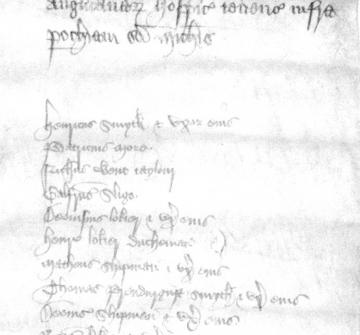Aliens in Bristol in the Middle Ages

Later medieval Bristol was one of England’s three largest cities, and its most important provincial port, so it is not surprising that it attracted settlers from far and wide. While Bristol had undoubtedly played host to migrants from outside England before then, only from the fifteenth century is it possible to make any kind of estimate of numbers. This is because the first attempts at counting ‘aliens’ – those born outside of the king of England’s territories – began in the 1440s, undertaken for the purposes of taxing them. The results, the Alien Subsidies, confirm that Bristol had a significant Irish population, as well as a handful of continental Europeans, mainly from the Netherlands. There was also a number of Icelandic servants working in the town until at least the 1480s, at least some of whom may in fact have been slaves, kidnapped or bought by English sailors in Iceland. In addition, there was a substantial number of Welsh settlers; these were not counted as aliens, and so do not appear on the Alien Subsidies, but men with Welsh names figured strongly in the Bristol evidence at all levels, including the highest: under the first Tudor king, Henry VII (himself partly of Welsh descent), perhaps around a quarter of Bristol’s Common Council (its governing body) had Welsh origins.
Content generated during research for the paperback book 'Bristol: Ethnic Monorities and the City 1000-2001' (ISBN 13 : 978-1-86077-477-5 ) for the England's Past for Everyone series





